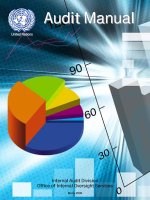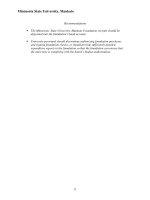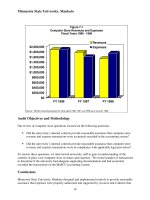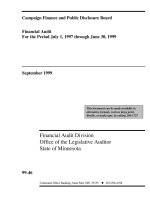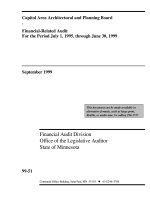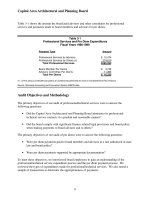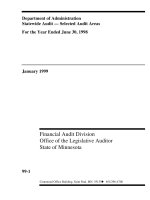Central Lakes College Financial Audit For the Period July 1, 1995, through June 30, 1998 May 1999 Financial Audit Division Office of the Legislative Auditor State of Minnesota_part1 potx
Bạn đang xem bản rút gọn của tài liệu. Xem và tải ngay bản đầy đủ của tài liệu tại đây (218.33 KB, 10 trang )
Central Lakes College
Financial Audit
For the Period July 1, 1995, through June 30, 1998
May 1999
Financial Audit Division
Office of the Legislative Auditor
State of Minnesota
99-27
Centennial Office Building, Saint Paul, MN 55155 651/296-4708
SUMMARY
State of Minnesota
Office of the Legislative Auditor
1st Floor Centennial Building
658 Cedar Street • St. Paul, MN 55155
(651)296-1727 • FAX (651)296-4712
TDD Relay: 1-800-627-3529
email:
URL:
Central Lakes College
Financial Audit
For the Period July 1, 1995, through June 30, 1998
Public Release Date: May 14, 1999 No. 99-27
Background
Central Lakes College was created on July 1, 1995, when the Brainerd Community College
merged with the Brainerd Staples Technical College. The individual colleges merged with other
state universities, community colleges, and technical colleges to form the Minnesota State
Colleges and Universities (MnSCU).
Our audit scope included a review of college financial management, tuition and fees, payroll,
operating expenditures, and bookstore operations for the period July 1, 1995, through June 30,
1998. We also audited the administration of federal and state student financial aid programs for
fiscal year 1999.
Conclusions
Central Lakes College operated within its available resources and had an effective process to
monitor revenue and expenditure budgets. The college had adequate controls in place to provide
reasonable assurance that financial activities were properly recorded on MnSCU accounting and
MAPS.
Regarding the college’s general financial management, the college was not able to reconcile its
cash balance recorded on the MnSCU accounting system to the bank statements and did not
evaluate its collateral balance for its local account. The college also did not monitor the status of
its operating relationship with the college foundation, and needs to improve its security controls
over college computerized business systems.
Central Lakes College also had internal control weaknesses and some instances of
noncompliance with state and federal requirements related to tuition receipts, payroll, the
bookstore, and student financial aid. The college did not promptly deposit tuition and
customized training receipts with the state treasury and did not adequately safeguard tuition and
fee revenues. The college did not monitor tuition administrative adjustments. The college did
not adequately separate personnel and payroll functions and did not separate the work-study
payroll input and disbursing functions. The college did not consistently conduct annual
employee evaluations. The financial aid office had unnecessary access to financial aid checks.
The Staples campus bookstore lacked proper separation of duties. The college did not complete
a physical inventory of equipment, did not provide adequate security for the business office, and
did not adequately safeguard newly purchased supplies and equipment in the bookstore and the
maintenance room.
Central Lakes College agreed with the audit findings and has already taken significant action
towards resolving the findings.
STATE OF MINNESOTA
OFFICE OF THE LEGISLATIVE AUDITOR
JAMES R. NOBLES, LEGISLATIVE AUDITOR
Representative Dan McElroy, Chair
Legislative Audit Commission
Members of the Legislative Audit Commission
Mr. Morrie J. Anderson, Chancellor
Minnesota State Colleges and Universities
Members of the Minnesota State Colleges and Universities Board of Trustees
Ms. Sally J. Ihne, President
Central Lakes College
We have audited Central Lakes College for the period July 1, 1995, through June 30, 1998, as
further explained in Chapter 1. Our audit scope included tuition and fees, payroll, operating
expenditures, and bookstore activities. We also reviewed the college’s internal controls over
compliance with federal student financial aid for fiscal year 1999.
We conducted our audit in accordance with generally accepted auditing standards and
Government Auditing Standards, as issued by the Comptroller General of the United States.
These standards require that we obtain an understanding of management controls relevant to the
audit. The standards also require that we design the audit to provide reasonable assurance that
Central Lakes College complied with the provisions of laws, regulations, contracts, and grants
significant to the audit. The management of Central Lakes College is responsible for establishing
and maintaining the internal control structure and for compliance with applicable laws,
regulations, contracts, and grants.
This report is intended for the information of the Legislative Audit Commission and the
management of Central Lakes College. This restriction is not intended to limit the distribution of
this report, which was released as a public document on May 14, 1999.
James R. Nobles Claudia J. Gudvangen, CPA
Legislative Auditor Deputy Legislative Auditor
End of Fieldwork: February 26, 1999
Report Signed On: May 11, 1999
1ST FLOOR SOUTH, CENTENNIAL BUILDING 658 CEDAR STREET ST. PAUL, MN 55155
TELEPHONE 651/296-4708 TDD RELAY 651/297-5353 FAX 651/296-4712 WEB SITE
Central Lakes College
Table of Contents
Page
Chapter 1. Introduction 1
Chapter 2. Financial Management 3
Chapter 3. Tuition, Fees, and Other Receipts 7
Chapter 4. Payroll 11
Chapter 5. Student Financial Aid 15
Chapter 6. Bookstore Operations 19
Chapter 7. Purchased Services, Supplies, and Equipment 23
Status of Prior Audit Issues 27
Central Lakes College Response 29
Audit Participation
The following members of the Office of the Legislative Auditor prepared this report:
Claudia Gudvangen, CPA Deputy Legislative Auditor
Cecile Ferkul, CPA, CISA Audit Manager
Jack Hirschfeld, CPA Auditor-In-Charge
Connie Stein Senior Auditor
Keith Bispala Auditor
Irene Hass Auditor
Exit Conference
We discussed the findings and recommendations with the following representatives of Central
Lakes College and the MnSCU system office at the exit conference held on April 28, 1999:
MnSCU System Office:
Laura King Vice Chancellor, Chief Financial Officer
Rosalie Greeman Associate Vice Chancellor
Deb Winter Director of Campus Accounting
John Asmussen Executive Director – Internal Auditing
Melissa Primus Audit Coordinator – Internal Auditing
Central Lakes College:
Sally Ihne President
Kari Christiansen Director of Business Services
Lori Bates Assistant Director of Business Services
Central Lakes College
1
Chapter 1. Introduction
Central Lakes College is comprised of Brainerd Community College and the Brainerd Staples
Technical College. Brainerd Community College was formed in 1938 as part of the local school
district. At that time, the college included both technical career programs and a college transfer
program. Staples Technical Institute was opened in 1959. The Brainerd Technical Institute was
opened in 1964. In 1963 the State of Minnesota formed the State Junior College System. The
Brainerd Community College transfer classes became a part of the new Junior College System,
while the technical programs remained under the auspices of the school district. In 1991 the
Board of State Technical Colleges combined the administration of Brainerd Technical College
with Staples Technical College to form the Brainerd Staples Technical College. Brainerd
Community College and the Brainerd Staples Technical College were consolidated to create the
Central Lakes College on July 1, 1995.
The Staples Campus remains the center for training in heavy equipment, machine tool
technology, media and communications, and a unique robotics and automated systems
technology program. The Brainerd Campus provides 26 technical programs and a two-year
liberal arts transfer curriculum. Central Lakes College has 139 full-time faculty. Sally Ihne was
president of the Brainerd Community College prior to the consolidation into MnSCU. The
MnSCU Board of Trustees appointed Sally Ihne president of Central Lakes College in 1995.
Table 1-1 shows attendance at Central Lakes College for fiscal years 1996-1998.
Table 1-1
Central Lakes College
Full-Year Equivalent (FYE) Student Counts
Fiscal Fiscal Fiscal
Course Year Year Year
Study 1996 1997 1998
Liberal Arts Division 1,267 1,249 1,334
Technical Division 1,353 1,313 1,207
Total FYE 2,620 2,562 2,541
Source: Central Lakes College Human Resource Division.
The financial activity for fiscal year 1998 for Central Lakes College is shown in Table 1-2. State
appropriations and tuition and fees support the General Fund Activity. The Special Revenue
Fund includes federal and state student financial aid. The Enterprise Fund includes financial
activities from the bookstore and parking.
Central Lakes College
2
Table 1-2
Central Lakes College
Fiscal Year 1998 Financial Activity
Special
General Revenue Enterprise
Fund Fund Fund
Beginning Balance $ 3,078,635 $ 351,605 $ 620,911
Revenue:
State Appropriation 12,666,343
Tuition and Fees 5,957,363 308,341
Bookstore Receipts 1,172,749
Student Financial Aid 3,622,323
Federal Grants 585,854
State Grants 600,583 137,695
Parking Fees 47,544
Non-Mandatory Transfers 560,871 125,721 166,838
Other 441,434 439,836 85,672
Total Revenue $20,226,594 $5,219,769 $1,472,803
Expenditures:
Salaries and Fringe $13,113,405 $ 665,683 $ 220,890
Purchased Services 1,865,533 238,088 948
Supplies 1,730,851 276,706 25,421
Equipment 611,629 12,354 11,284
Bookstore Purchases 921,153
Student Financial Aid 3,613,299
Non-Mandatory Transfers 527,565 140,636 121,480
Other 2,064,227 281,875 136,209
Total Expenditures $19,913,210 $5,228,642 $1,437,385
Fund Balance as of June 30, 1998 $ 3,392,019 $ 342,733 $ 656,329
Note: The financial information is presented in the budgetary basis of accounting. This basis does not include long-term assets
and liabilities. Examples of financial activities not included in the table are tuition receivables not collected as at the close
of books and compensated absence liabilities. The college has reserved $1,928,620 of the ending General Fund Balance
for future commitments that include repair and betterments, customized training, and encumbrances and grants. The
reserve also includes funds for the Central Minnesota Distance Learning Network (CMDLN) of which Central Lakes
College is the fiscal agent. The college’s June 30, 1998, compensated balance is estimated to be $1,340,853. Enterprise
activities do not include all operating costs such as rent, utilities, or depreciation.
Source: MnSCU to MAPS Trial Balance as of February 9, 1999.
Central Lakes College is affiliated with the Central Lakes College Foundation, which is a
separate non-profit organization. The foundation has its own board of directors, articles of
incorporation, and bylaws. The foundation maintained its own financial records and accounts
that were audited by a CPA firm. The foundation received staffing and other administrative
support from Central Lakes College, totaling approximately $50,000 for each fiscal year. In
return, the foundation provided student scholarships and grants that benefit the educational
mission of the college. The fiscal year 1997 financial statements showed the foundations
awarded $62,000 in scholarships. As explained in Chapter 2, Finding 2, the college needs to
improve some aspects of its relationship with the foundation.
Central Lakes College
3
Chapter 2. Financial Management
Chapter Conclusions
Central Lakes College operated within its available resources and had an
effective process to monitor its revenue and expenditure budgets. The college
had adequate controls in place to provide reasonable assurance that financial
activities were properly recorded on MnSCU accounting and MAPS. However,
the college needs to make some improvements to its financial management.
• The college was not able to reconcile its cash balance recorded on the
MnSCU accounting system to the bank statements.
• The college did not monitor the status of its operating relationship with the
college foundation.
• The college did not evaluate its collateral balance for its local account.
• Security controls to access college computerized business systems require
improvement.
• As discussed in Chapters 3 through 7, there were a number of internal
control issues related to tuition receipts, payroll, the bookstore, and student
financial aid.
MnSCU receives the majority of its funding for operations from General Fund appropriations
and tuition and fees assessed to students. The MnSCU system office allocates state
appropriations to Central Lakes College, and all other universities and colleges, based upon an
allocation formula.
The statewide accounting system (MAPS) is the primary accounting system for funds held in the
state treasury. Campuses use the MnSCU accounting system to initiate transactions that
interface into MAPS to generate warrants from the state treasury. Campuses also administer
certain activities in local bank accounts, such as the bookstore and student financial aid. MnSCU
requires that colleges record all local activities on MnSCU accounting to provide a complete and
comprehensive view of all college finances
Audit Objectives and Methodology
Our review of Central Lakes College overall financial management focused on the following
objectives:
• Did the college design and implement internal controls to provide reasonable assurance
that financial activities were properly recorded on the MnSCU and MAPS accounting
systems?
• Did the college comply with applicable legal provisions regarding local bank accounts?
Central Lakes College
4
• Did the college design and implement internal controls to provide reasonable assurance
that it operated within available financial resources in compliance with applicable legal
provisions and management’s authorization?
• Did the college design and implement internal controls to provide reasonable assurance
that it had an appropriate relationship with related organizations?
To answer these questions, we interviewed college personnel to gain an understanding of the use
of MnSCU accounting for the program areas included within our audit scope. We also gained an
understanding of management controls, such as budget monitoring and reconciliations, in place
over financial activities.
Conclusions
• Central Lakes College operated within its available resources and had an effective
process to monitor its revenue and expenditure budgets. The college had controls in
place to provide reasonable assurance that financial activities were properly recorded on
MnSCU and MAPS. The college was not able to reconcile its cash balance recorded on
the MnSCU accounting system to the bank statements.
• The college did not monitor the status of its operating relationship with the college
foundation.
• The college did not evaluate its collateral balance for its local account.
• Security controls to access college computerized business systems require improvement.
• As discussed in Chapters 3 through 7, there were a number of internal control issues
related to tuition receipts, payroll, the bookstore, and student financial aid.
1. PRIOR AUDIT FINDING PARTIALLY RESOLVED: The college was unable to
reconcile the cash balance recorded on the MnSCU accounting system to the bank
statements.
Central Lakes College was unable to resolve differences between the cash balance recorded on
the MnSCU accounting system to the cash in its Central Lakes College bank account. In fiscal
years 1996 through 1998, the college attempted to reconcile on an annual basis the cash in the
bank to the cash balance on their accounting system. Differences between the cash balance
recorded on MnSCU accounting to the cash in the bank ranged from $1,154 to $5,260. The
college started reconciling on a monthly basis in fiscal year 1999. The reconciliation process
resulted in differences ranging from $14,707 in July 1998 to $52,240 in October 1998. Finally,
for November and December of fiscal year 1999, they identified a consistent difference of
$51,721 more in the bank than on MnSCU accounting. However, the college has not been able
to determine the reason for the difference. To ensure the accuracy of accounting records, the
college should perform timely and complete reconciliations of cash balances to bank account
activity.
Recommendation
• The college should review accounting records and make appropriate
adjustments for the cash differences. Any future differences between
accounting records and bank account activity should be identified and
resolved in a timely manner.
Central Lakes College
5
2. The college did not monitor the status of its operating relationship with the college
foundation.
Central Lakes College had three separate foundations for fiscal years 1996 and 1997. The
Brainerd Technical College Trust Foundation and the Staples Trust Association supported the
Brainerd Staples Technical College, while the Brainerd Community Lakes College Foundation
supported the Brainerd Community College. The foundations operated independently until fiscal
year 1998, when they merged to form the Central Lakes College Foundation. The college
established a contract with the foundation in fiscal year 1998. As explained below, the
foundation’s bylaws conflicted with the contract provisions. Also, the college did not review its
financial relationship with the foundation, and did not bill or collect the foundation scholarships
in a timely manner.
A provision in the foundation bylaws conflicted with MnSCU contract requirements. Six
members of the foundation board are faculty at the college. The contract between the college
and the foundation states that faculty serving on the foundation board shall not be voting
members of the board. However, the foundation board bylaws state that all members shall have
voting rights at the annual meeting. Consequently, the six faculty board members would have
voting rights for the annual meeting, which would violate the provisions of the contract. A
representative of the foundation stated that this provision was a carryover resulting from the
merger of the three foundations. He further stated that the foundation would revise the bylaws to
reflect the provisions of the contract.
The college did not review the financial status of its relationship with the foundation. The
foundation had a fund balance of $2,244,279 as of December 31, 1997. The foundation provided
students $62,000 in scholarship aid during fiscal year 1997. In analyzing the foundation
contributions to the college in fiscal year 1997, we concluded that the amount of scholarship aid
exceeded the cost of the college’s administrative assistance to the foundation. The college did
not complete this exercise on a routine basis. Contract provisions require that the college
evaluate the status of the contract on an annual basis.
Finally, the college did not bill or collect the foundation scholarships timely in fiscal year 1999.
The fall semester registration began in August 1998. After the drop out period, the college
reviewed and prepared the billing to the foundation for scholarship awards. The college did not
bill the foundation for $58,000 of scholarship aid credited to the student’s accounts until
October 21, 1998. They did not receive the check from the foundation until January 12, 1999.
As a result, the college carried the cost of the scholarship aid for approximately four months.
Recommendations
• The college should ensure that none of the faculty on the foundation board
have voting rights.
• The college should annually review the financial cost and operation of
providing administrative services to the foundation.
• The college should ensure that it bills the foundation and collects the
scholarship aid in a timely manner.
Central Lakes College
6
3. The college did not evaluate its collateral balance for its local account.
The college’s local bank did not maintain sufficient collateral for the college bank account for
specific periods during the year. Minnesota Statutes require state agencies to establish collateral
equal to 110 percent of the amount on deposit at the close of the business day, less any insured
portion.
The college did not maintain sufficient collateral during the months of August and December.
Tuition receipts during these peak registration periods increased the bank balance above the
collateralized amount. For example, the bank balance on August 31, 1998, was $2,419,395,
while the market value of the collateral was approximately $1,451,663. The remaining months
of the year the bank balance was below the collateralized amount. To provide for sufficient
collateral, the college should obtain additional collateral for the months of December and
August. The college should also review the relationship between the bank balances and the
collaterlized amount during the rest of the year to monitor its collateral needs.
Recommendation
• Central Lakes College should monitor bank cash and collateral balances to
ensure the bank pledges sufficient collateral to safeguard the college’s
account.
4. Security controls to access college computerized business systems require improvement.
Central Lakes College did not adequately monitor access to its computerized business systems,
including MnSCU accounting, SCUPPS personnel/payroll, and College Information System
(CIS). The college has primary authority and responsibility to ensure employee access is
necessary based upon job responsibilities. College departments did not periodically review
system user reports to monitor employee access to MnSCU accounting, SCUPPS, and CIS. The
business office did periodically monitor the propriety of its staff’s access to MnSCU accounting,
but could not determine whether access was limited to only appropriate staff. The computer
system administrator did not distribute monthly reports showing individuals with system access.
The monthly reports would allow each department to periodically review system access and
ensure it is limited to authorized employees.
Recommendation
• Central Lakes College should improve security access controls by
periodically reviewing system user security reports and correcting any
inappropriate system access.
